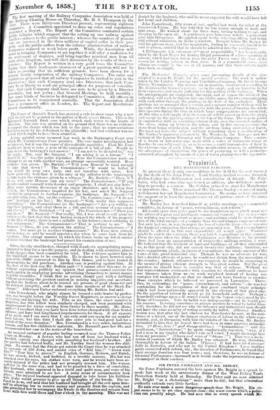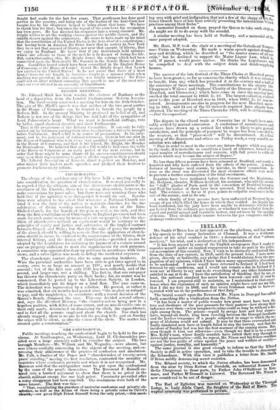SIB. PETER FAIRDAIRN AND MIt. BRIGHT.
Sir Peter Fairbairn entered the lists against Mr. Bright in a speech he made last week at the anniversary dinner of the West Riding Trade Protection Society held at Barnsley. Sir Peter said no man admired Mr. Bright "as a rhetorician" more than he did; but that admiration evidently extends very little further.
No man ever made a more dangerous speech than Mr. Bright. His ob- ject seems to be to set class against clines—the worst course which a politi- CMS t>ai possibly adopt. Ho had seen this in every speech oh' Mr. Bright had made for the last few years. That gentleman has done good service to the country, and being one of the leaders of the Anti-Corn-law League has by his eloquence helped to bring about that issue. We have to thank him for that; but since the repeal of the corn-laws his occupation has been gone. He has directed his eloquence into a wrong channel. Mr. Bright wishes to set the working classes against the middle classes, and the middle classes against the aristocracy. He seems to have made up his mind that the constitution of the United States is the beau ideal of a constitution but having been in America Sir Peter knew that in society in New York they have not that amount of liberty, nor near that amount of liberty, that we enjoy in England. He knew that if any individuals held opinions which are adverse to those of the mob he is in danger of losing his life. But, notwithstanding this, Mr. Bright forgot the outrage which had been committed upon the Honourable Mr. Sumner in the Senate House of Ame- rica. Could that brutal attack have been committed in the English House of Commons or the House of Lords ? Could Mr. Bright forget that Lynch law existed in the United States? Is he not aware that duels of a most brutal character are fought in America—fought in a manner which when duelling was prevalent in this country was totally unknown ? Sir Peter could not sit silent without censuring that speech as one of the most mis- chievous ever uttered in an assembly of Englishmen.



































 Previous page
Previous page